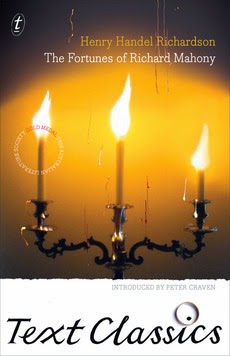 Staff Review by Chris Saliba
Staff Review by Chris SalibaHenry Handel Richardson's extraordinary three novel cycle, The Fortunes of Richard Mahony, examines our strong propensity for self-delusion and vanity, and the havoc it can wreak on others.
Best known for her Australian classic The Getting of Wisdom, Henry Handel Richardson was born Ethel Florence Lindesay Richardson in East Melbourne, 1870. She published all her novels under this male pseudonym. Her father, Walter Lindesay Richardson, was a doctor. He contracted syphilis, was admitted to a mental asylum and died when young Ethel was only nine years old. His death, we learn from the short author bio at the front of this Text Classics edition, had a huge impact on his family.
The subject matter Ethel Richardson took for her hugely ambitious The Fortunes of Richard Mahony makes this abundantly clear. A cycle of three novels that were published over an eleven year period, the plot of the 900 page story is very much an anatomy of her parent's marriage. The first part, Australia Felix was published in 1917, followed by The Way Home in 1925 and lastly Ultima Thule, in 1929. The three novels together were published as The Fortunes of Richard Mahony in 1930.
As the title suggests, the novel chronicles the 'fortunes' of Richard Mahony. Yet this title is rather ironic, as Richard sabotages his own good luck at every turn. The story starts with Richard trying his luck out on the Ballarat gold fields. He has come out from England, and is determined to make his fortune. Not all has gone his way though, and he finds himself having to make ends meet as a shop keeper. A further indignity is piled upon this failure: he's actually qualified as a doctor and hence finds himself performing work beneath his station. Here is a key to Mahony's character. His existential struggle in life is to find his rightful place in society, or where he thinks that should be. At every turn in his fortunes, however, he feels himself either unappreciated or misunderstood. He's always dissatisfied with life, yet the high value he puts on his abilities and qualities is not shared by the societies he tries to join, whether they be English or Australian. It is partly his own fault, but he finds he doesn't belong anywhere
In truth Richard is a vacillating mess of ambition, self-delusion, vanity and childish irresponsibility. His restlessness doesn't spur him to any great achievements, but rather highlights his weakness of mind and character. While he slowly unravels and eventually spins out of control, it is his wife, Mary, who must become the backbone of the marriage. She is long-suffering, practical, loyal and hemmed in by the conventions of the time. The Fortunes of Richard Mahony is not an overtly feminist work, but it concerns itself very much with the status of women. The reader can't help but think Mary would be better off on her own. In some ways, Mary achieves independence at the end of the novel, but at a dreadful cost. She must lower her social status, take on paid work as a post mistress (just as Richardson's own mother did) and try to look after her ailing husband. Her burdens are extraordinary.
The end result is a humbling experience. The novel, or cycle of novels, is not a hatchet job on Richardson's father, although it's certainly not a flattering portrait, by any means. The novel very much sympathises with the plight of a smart, practical woman tied to a self-destructive and delusional man. Yet Richardson also honors the marriage as one based on true affection. Mary cares for and protects her husband, despite all the grief he has brought her. The lesson that the story teaches is to appreciate what you've got, be humble and resist getting on your high horse. When reading through Mahony's many delusions, his yearnings for status, fame and money, it's not difficult to see yourself in this fictional mirror. None of us are innocent of such desires. Richardson shows what can happen when they're given full license.
The Fortunes of Richard Mahony, by Henry Handel Richardson. Published by Text Classics. ISBN: 9781921922282 RRP: $12.95
To sign up for our monthly newsletter, featuring new releases, book reviews and favourite articles from around the web, click here.
No comments:
Post a Comment